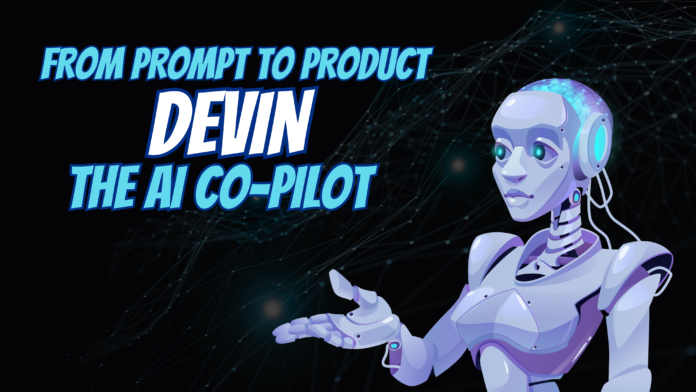The world of software development is on the cusp of a revolution, and the name leading the charge is Devin. But Devin isn’t your typical programmer – it’s an AI, touted as the world’s first AI software engineer. Buckle up, because we’re diving deep into Devin’s capabilities and exploring its potential impact on the future of coding.
So, what exactly can Devin do in a truly remarkable and awe-inspiring way? This powerhouse of artificial intelligence is capable of some seriously impressive and highly extraordinary feats. Imagine giving Devin a simple and straightforward prompt – “build me a user-friendly mobile application to meticulously track and monitor my fitness goals.” Devin can then take that prompt and transform it into a fully functional and completely operational app, replete with an intuitive and user-friendly interface and features designed comprehensively to help you stay on track and achieve your fitness objectives. It can even write the code behind the scenes, working tirelessly and meticulously!
Don’t stop there – Devin can also develop complex and intricate software applications based on your instructions. Whether it’s a web application for meticulously managing a large and extensive team or a program for comprehensively analyzing scientific data, Devin can handle the coding legwork with proficiency and efficiency.
Now, here’s a question that’s probably buzzing incessantly and persistently in your head: is Devin here to usurp our occupations and livelihoods? Fear not, my fellow programmers! While advancements in Artificial Intelligence are undeniably significant and consequential, experts suggest Devin is more akin to a valued teammate than a cutthroat competitor.
Think of it in this way – Devin tackles the repetitive and mundane tasks of generating code, effectively emancipating your precious time to concentrate on the grand scheme of things. Your ingenuity, prowess in problem-solving, and critical thinking abilities will remain irreplaceable and unchallenged in the face of even the most sophisticated AI.
The future of software development with AI powerhouses like Devin pulsates with boundless and brimming possibilities. Imagine the breakneck speed and unparalleled efficiency at which software projects could be completed with the indispensable assistance of AI. This revolutionary development effectively democratizes software creation, making it potentially significantly easier even for non-programmers, those traditionally excluded from the realm of coding, to bring their innovative ideas to life. Imagine a world where entrepreneurs with a game-changing idea but no coding knowledge can collaborate with AI tools to develop a functional prototype, or where educators can leverage AI to create interactive learning applications without writing a single line of code.
However, noteworthy challenges still persist on the horizon. Debugging AI-generated code, the byproduct of labyrinthine algorithms rather than meticulously crafted human-written logic, could erupt as a new and formidable obstacle. Unraveling the intricate and convoluted decision-making processes employed by AI to pinpoint and rectify errors lodged within its code will necessitate the development of innovative and ingenious debugging techniques.
Furthermore, security vulnerabilities nestled within software meticulously crafted by AI necessitate scrupulous consideration and the implementation of stringent safeguards. As AI progressively evolves and becomes increasingly adept at generating code, potential security exploits capable of compromising these programs escalate into a cause for significant concern. Mitigating these burgeoning risks will necessitate a collaborative effort between AI developers, those wielding expertise in the realm of security, and policymakers. By working in concert, this collective can establish robust security frameworks specifically designed to safeguard AI-generated code, ensuring its functionality and mitigating the potential for exploitation.
Ethical questions also arise and necessitate contemplation – who assumes the mantle of responsibility for code authored by an AI? As we stand on the precipice of this novel era, one fact stands out as undeniably clear: Devin signifies a momentous stride forward in the domain of coding. While it’s not here to supplant us or render our skills obsolete, it possesses the potential to revolutionize the manner in which we approach software development. The future unfolds as a collaborative endeavor between human ingenuity and the potency of AI, and the possibilities are genuinely enthralling. Let’s maintain the momentum of this discourse – what are your contemplations on Devin and the future of AI in coding? Impart your thoughts in the comments below!
This collaborative future between AI and humans brings with it a multitude of questions that demand our attention. One such question centers on the realm of ethics and accountability. In a world where AI plays an increasingly prominent role in code generation, who should be held responsible for any errors or malfunctions that arise? Is it the AI developer who created the underlying algorithms? The programmer who utilized the AI tool to generate the code? Or perhaps there is a shared responsibility that needs to be carefully defined?
These are complex questions that will require ongoing discussion and collaboration between ethicists, policymakers, AI developers, and programmers. By working together, we can ensure that AI is developed and implemented in a responsible and ethical manner, fostering a future where AI serves to augment human capabilities rather than replace them.

